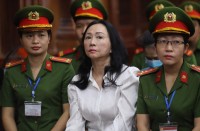BEIJING, CHINA (Reuters) — China’s economy grew 6.9 percent last year, the slowest in more than two decades.
While declaring that pace of growth was hardly shabby, the government admits China’s investment-fed model of growth has reached its boundaries, and a more sustainable path of development is needed, and industrial overcapacity and high debt levels will have to be slashed.
As China restructures its inefficient state sector and shuts debt-laden “zombie” firms in bloated sectors, job losses are only to be expected, particularly in steel and coal. Provinces such as Shanxi, Hebei and the rustbelt region in the northeast will feel the pinch during this period of transition.
China expects to lay off 1.8 million workers in the coal and steel industries, the government said on Monday (February 29), without giving a timeframe. Beijing has said it will allocate 100 billion yuan ($15 billion) over two years to relocate workers laid off in sectors including steel.
Duan Tinglin, from the northeastern industrial powerhouse of Heilongjiang, has been coming to Beijing every winter to look for work. This year’s job hunt is much harder than in previous years, said the 39-year-old unemployed migrant.
“I personally believe that work is difficult to find right now. Why? Because I’m just an average labourer, and in the capital, supply exceeds demand for your average labourers. That’s what I think. You can see it’s just full of people here, but to find a job that really fits someone is quite difficult. Finding a job to really fit someone’s standards is quite difficult accommodation here is really expensive,” said Duan.
To a lesser extent, recent university graduates are also feeling the pinch.
Some said while there are jobs available, they are not necessarily in cities they want to move to.
“I think (work) is pretty difficult to find. For the industry I want to go into, there aren’t very many jobs here. The (work) is mainly collected in the South, but my home is in the North, and I really don’t want to go to the South and look for work. It’s difficult to find work in the North, so that’s how it is,” said Jia Yuliang, a recent university graduate looking for work in Beijing.
China’s urban jobless rate has remained largely stable in recent years. It was at 4.05 percent at the end of 2015, despite the slower economy.
Many economists attribute that to China’s one-child policy, which has led to a steady drop in the population of working-age adults. In 2015, the working-age population declined for the fourth straight year.
Zhang Yi, vice director of the Chinese Academy of Social Science’s department of sociology, said that the government has started to take measures to relocate parts of the labour force out of first-tier cities.
“Whether they should find a job in Beijing seeking a higher salary return, or (look for work) in another location, there is a gradual (adjustment) between the government-adjusted job market and the job market that individuals are seeking,” said Zhang.
Jiang Shuaihui is a 25-year-old migrant from central Henan province who recently found a job at a customer service call centre in Beijing.
He said although it doesn’t pay much, he’s satisfied given the current economic climate.
“I will pretty much cherish this job, because looking for work is extremely difficult, and you have to work hard to find a job. I wasn’t going to say that I was going to give up. If I said I was going to give up, then maybe I would find a similar job. After all, I’ve worked in this industry before. I’d have to slowly get used to another industry,” he said.
Unemployment is an important issue for the Communist party, whose economic policies have increased the material well-being of a generation of people unaccustomed to the poverty and deprivation their parents and grandparents faced.
The tricky part is to do all that without risking massive layoffs that could trigger widespread social unrest.
The government has urged migrant workers – totalling more than 200 million – and China’s large number of college graduates to be self-employed. That includes starting their businesses in smaller cities or rural areas.
Local governments have also pressured business owners to refrain from cutting staff in the name of social stability.
Job destruction from a slowing Chinese economy and reform of state enterprises will put pressure on policymakers to come up with measures to create employment as Beijing finalises its plan for China’s development over the next five years.
The release of the 13th Five-Year Plan will coincide with the start of the annual meeting of parliament on March 5 where thousands of delegates will gather in Beijing. Premier Li Keqiang is expected to announce China’s economic goals – including the government’s gross domestic product target for 2016 – in his yearly work report.







